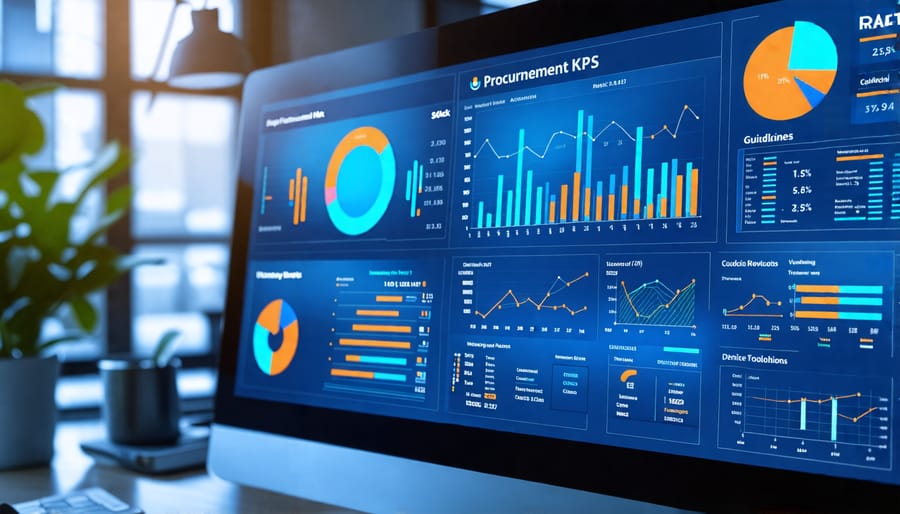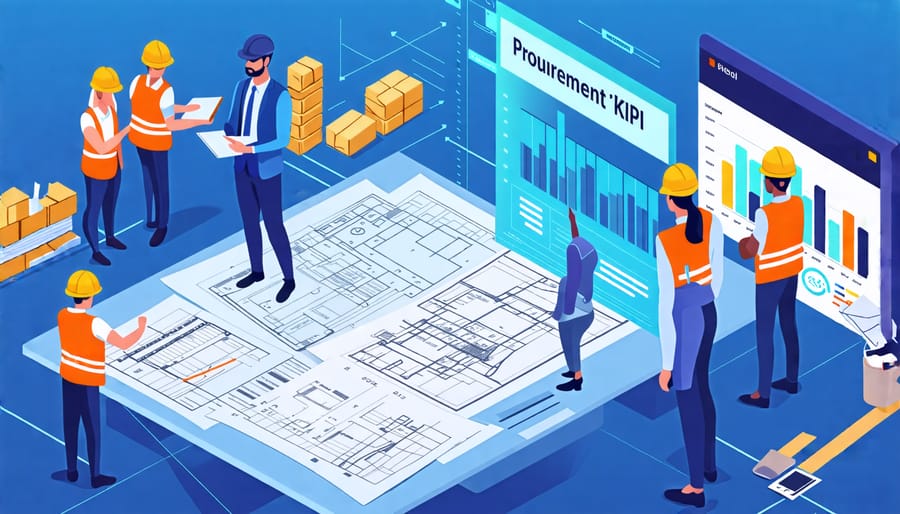Streamline procurement by establishing clear policies, standardizing contracts, and leveraging supplier relationship management software to track performance. Mitigate risks through comprehensive due diligence, financial stability assessments, and robust contingency planning. Optimize costs and quality by conducting thorough market research, issuing competitive RFPs, negotiating aggressively, and continuously monitoring supplier performance against SLAs. Accelerate timelines with efficient stakeholder engagement, parallel processing of procurement activities, and expedited approvals enabled by cross-functional collaboration. Ensure compliance by embedding regulatory requirements into procurement processes, training staff on policies, and conducting regular audits.
The Project Procurement Process
Planning
Procurement planning is a critical phase in project procurement management that sets the stage for successful sourcing and acquisition of goods and services. The first step is to define the project’s requirements, including the scope, specifications, quantities, and timelines. This involves collaborating with stakeholders to identify and document the project’s needs comprehensively.
Next, a procurement management plan is developed, outlining the strategies, processes, and procedures for managing procurement activities. This plan addresses key aspects such as the procurement approach (e.g., competitive bidding, sole sourcing), contract types, risk management, and performance metrics. It serves as a roadmap for the procurement team and ensures alignment with the project’s objectives.
Identifying potential suppliers is another essential component of procurement planning. This involves researching and prequalifying suppliers based on their capabilities, experience, reputation, and financial stability. Techniques such as market analysis, supplier assessments, and request for information (RFI) can be employed to gather data on potential suppliers. By carefully evaluating and shortlisting qualified suppliers, the project team can mitigate risks and increase the likelihood of successful procurement outcomes.
Effective procurement planning lays the foundation for efficient and cost-effective sourcing, ultimately contributing to the project’s success. It enables proactive risk management, fosters collaboration with suppliers, and ensures that the right goods and services are procured at the right time and price.

Selection
The supplier selection process is a critical component of project procurement management. It begins with soliciting bids from potential suppliers, which involves preparing and distributing a comprehensive Request for Proposal (RFP) document. The RFP should clearly outline the project requirements, specifications, timelines, and evaluation criteria.
Upon receiving proposals from interested suppliers, the procurement team carefully evaluates each submission based on predefined criteria. These criteria typically include factors such as supplier experience, technical capabilities, financial stability, references, and cost. A weighted scoring system is often employed to objectively assess and compare proposals.
After thorough evaluation, the procurement team shortlists the most promising suppliers and may conduct interviews or request additional information to clarify any uncertainties. Site visits to the suppliers’ facilities can provide valuable insights into their operations and capacity to deliver on the project requirements.
Finally, the procurement team selects the supplier that offers the best overall value, considering both technical and financial aspects. Contract negotiations ensue, addressing terms such as scope of work, deliverables, timelines, payment schedules, and performance metrics. Once an agreement is reached, the contract is awarded, and the supplier becomes an integral part of the project team, working closely with the organization to ensure successful project delivery.
Administration
Contract administration is a critical aspect of project procurement management, ensuring that suppliers fulfill their obligations and the project stays on track. This phase involves closely monitoring supplier performance against agreed-upon metrics and milestones. Regular progress reports, on-site inspections, and quality audits help identify any deviations or issues early on.
Effective contract administration also includes processing payments to suppliers based on their progress and adherence to contract terms. This requires diligent record-keeping, invoice verification, and timely approvals to maintain positive supplier relationships and keep the project moving forward.
Throughout the project, changes may arise due to unforeseen circumstances, scope adjustments, or evolving requirements. Procurement managers must proactively manage these changes by assessing their impact, negotiating necessary contract modifications, and documenting all agreed-upon revisions. Clear communication and collaboration with suppliers are essential to handle changes smoothly and minimize disruptions.
Successful contract administration relies on a systematic approach, attention to detail, and strong problem-solving skills. By closely monitoring supplier performance, making timely payments, and effectively managing changes, procurement managers play a vital role in ensuring the project achieves its objectives while maintaining positive relationships with suppliers.
Best Practices for Effective Procurement Management
Establish Clear Requirements
Establishing clear and detailed requirements is a crucial step in successful project procurement management. Without a solid foundation of accurate specifications, the entire procurement process can be derailed, leading to delays, cost overruns, and subpar results. It is essential for project managers and their teams to invest significant time and effort into defining every aspect of the project’s requirements, from materials and equipment to timelines and budgets. This includes conducting thorough research, engaging with stakeholders, and leveraging industry expertise to ensure that all requirements are captured comprehensively. By prioritizing this critical phase, construction professionals can lay the groundwork for a streamlined and effective procurement process that delivers the desired outcomes.
Foster Supplier Relationships
Fostering strong, collaborative relationships with suppliers is a key aspect of successful project procurement management. By investing time and effort into building trusting partnerships, construction professionals can unlock numerous benefits. Effective supplier relationships lead to improved communication, enabling faster issue resolution and reducing the risk of misunderstandings. Suppliers who feel valued are more likely to go above and beyond, providing exceptional service and prioritizing your project’s needs. Collaborative relationships also facilitate innovation, as suppliers are encouraged to share their expertise and suggest improvements. Furthermore, strong supplier connections can result in more favorable contract terms, increased flexibility, and a willingness to work together to overcome challenges. By nurturing positive supplier relationships, construction projects can benefit from enhanced efficiency, quality, and overall success. Ultimately, the investment in building collaborative supplier partnerships pays dividends throughout the procurement process and contributes to the smooth execution of construction projects.


Leverage Technology
Procurement software and digital tools can significantly streamline the project procurement management process in construction. These technologies automate repetitive tasks, reduce manual errors, and improve communication among stakeholders. For example, e-procurement platforms enable teams to manage vendor relationships, track orders, and monitor deliveries in real-time. Digital bid management tools simplify the Request for Proposal (RFP) process, allowing for efficient collaboration and secure document sharing. Additionally, data analytics and reporting capabilities within procurement software provide valuable insights into spending patterns, supplier performance, and potential cost-saving opportunities. By leveraging these technologies, construction professionals can enhance transparency, boost efficiency, and make data-driven decisions throughout the procurement lifecycle. Ultimately, the strategic use of procurement software and tools can lead to reduced costs, improved quality control, and stronger supplier relationships in construction projects.
The Impact of Effective Procurement Management
Effective procurement management is crucial for the success of construction projects, as it directly impacts the bottom line and project outcomes. By implementing best practices in procurement, construction companies can realize significant cost savings through strategic sourcing, competitive bidding, and negotiation. Procurement professionals who leverage their market knowledge and relationships with suppliers can secure the best prices for materials, equipment, and services without compromising quality.
In addition to cost savings, a well-managed procurement process helps mitigate various risks associated with construction projects. Thorough vendor evaluation and selection ensure that suppliers are reliable, financially stable, and capable of delivering goods and services as required. Procurement teams can also address potential supply chain disruptions by diversifying suppliers and maintaining adequate inventory levels. Furthermore, effective contract management minimizes legal and financial risks by clearly defining roles, responsibilities, and performance expectations.
Timely completion of construction projects is another key benefit of successful procurement management. By streamlining the procurement process with the help of procurement software, teams can reduce lead times and ensure that materials and equipment arrive on site when needed. This helps prevent delays and keeps projects on schedule, ultimately leading to improved client satisfaction and reputation. Moreover, efficient procurement enables construction companies to respond quickly to changes in project scope or design, as they can source additional materials or services as required.
In summary, effective procurement management is a critical driver of success in construction projects. By focusing on cost savings, risk reduction, and timely completion, procurement professionals can contribute significantly to the overall performance and profitability of their organizations. As the construction industry continues to evolve, companies that prioritize procurement excellence will be well-positioned to thrive in an increasingly competitive market.
Conclusion
In conclusion, project procurement management is a vital component of successful construction projects. By strategically planning, executing, and controlling the acquisition of goods and services, procurement managers ensure that projects stay on schedule, within budget, and meet quality standards. Effective procurement management not only mitigates risks and fosters strong supplier relationships but also drives cost savings and enhances overall project performance. As the construction industry continues to evolve, mastering the art and science of procurement management will remain a critical skill for professionals seeking to deliver exceptional results and stay ahead in a competitive market.

